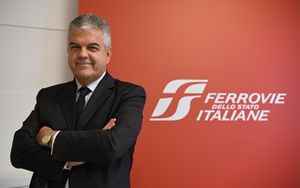(Finance) – Cost of energy bills and self-production of energy from renewable sources, compliance with the implementation times of the PNRR, summer growth in demand for railway mobility. These are some of the topics touched on by Luigi Ferraris, CEO of the FS Groupin an interview released on the sidelines of the Ambrosetti Forum, in Cernobbio, in which he illustrated the commitment of the Group and its Industrial Plan to support the country, in a historical situation as delicate as the current one.
“Energy is an important issue for us, we are an energy-intensive company, we consume about 2% of the national demand. Therefore we have launched a plan to self-produce it enhancing our spaces no longer functional to railway operations. In the medium to long term the goal is to cover at least 40% of our internal energy demand, about 2.6 TWh, mainly from solar and wind sources. This is combined with our short and medium-term energy efficiency plans, such as the project to optimize the use of traction energy, “said Ferraris.
Discounted the question on possible increase in rail ticket prices (moreover, the only ones not regulated and on which Trenitalia can act freely are those of the Frecce). The theme, Ferraris hinted, despite the rising cost of energy, it is not on the agenda, in fact, there is a strong awareness of how important it is “to contain the price of the train ticket, which today represents one of the key points for the development of sustainable mobility”. Ferraris – as stated on Fsnews.it – described the activities of the FS Group to contribute to the energy and ecological transition of the country, grappling with the current energy crisis, and the other actions taken to contribute to the national infrastructural relaunch in compliance with deadlines set out in the PNRR time schedule.
“One of our areas of activity – explained Ferraris – is linked to the construction of infrastructures: a business regulated and guided by investments that today are subjected to strong pressure both on the prices of materials and on logistics, with direct effects on our supply chain. Together with the Government we have adjusted the construction costs of the works by up to 30-40% and this has allowed us to keep pace to meet the 2026 target. We have also introduced bidirectional price revision clauses, so if there is a price reduction, we and the whole community will benefit from it. “
Ferraris points out that there has been a sharp surge in logistics costs, but now “we are seeing signs of gradual reabsorption, for example in the price of some raw materials ». Furthermore, he added that “at the system level, greater security of supply must be introduced, diversifying the suppliers of energy and raw materials £.
On the completion of the projects related to PNRRFerraris explained that “the planned investments will lead to an increase in the capacity of the railway network by 20% and a decrease in travel times up to going from Genoa to Milan with the High Speed in less than an hour and between Bari and Naples in 2 hours “. But the focus is not limited to passengers only.” We need to increase the freight transport by train – Ferraris said – managing the supply chain in an integrated manner with multimodal terminals that encourage railways over the long distance and facilitate the use of road transport in the last mile, between 100 and 200 kilometers “.
Positive opinion on the summer that is about to end in terms of number of travelers. “We have reached pre-covid levels and in some cases we have surpassed them – concluded Ferraris – and now we are working on a digital platform that better connects our services, both rail and road, so that our customers can plan their journey in an integrated way and buy it with a single ticket “.
